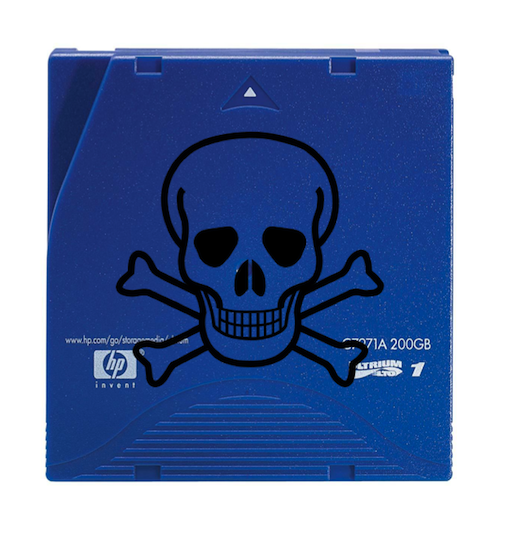I’m in a training course for a disk-only backup product, and in the introductory material, there’s a distinct message: tape is evil; tape is slow; tape is impossible to use; tape is unreliable. You’d be justified in wondering whether tapes should come with warnings, such as the following:
The horror! Tape = Bad. Disk = Good. Bad tape, Bad Bad Bad.
That’s the message, anyway.
The reality is far from the pseudo-science hype that marketing from disk-only backup products would have you believe. At times, I’ve seen more coherent arguments out of anti-vaccination campaigners than I have about the perils of tape. And the anti-vaccination rabble are raving lunatics.
The FUDtasia about tape could be summarised as follows:
- Tape is slow to recover from.
- Tape is unreliable.
- Tape is costly to duplicate.
To all three – I say one thing: pah! Lets look at each of them.
Tape is slow to recover from
This may be true for non-enterprise backup products, but the rationale espoused was unbelievable when you compare it against NetWorker. “Imagine if you have a 2TB filesystem backup, and you want to recover one single file. You might have to read through the ENTIRE 2TB to find your file.”
What. Utter. Rubbish.
Enterprise backup products – and in particular in this case, NetWorker – maintain comprehensive index information on the content of tapes. This allows them to use high speed seek operations against tapes to very quickly position themselves to the required area on tape for recovery. OK, this is not as instantaneous as initiating a read from a disk based backup, but it’s hardly akin to reading through a 2TB backup to find a single 16KB file.
Tape is unreliable
Yeah yeah yeah, blah blah blah. Tape is so terribly unreliable. That’s why it’s only been used for decades for backup, and all tape manufacturers are constantly fighting off class action lawsuits because their product is unfit for advertised use.
No. Wait.
The reality is that while tape is not guaranteed 100% reliable, neither is disk.
You can’t say that tape is unreliable when your defence is using RAID-protected storage. Take the RAID away, turn it into a stripe of disks instead, so that you can achieve the same performance as full streaming tape, and try to stand by your claim that tape is inherently less reliable than disk. I dare you.
I’ve been working in backup since 1996. I’ve never, in that entire time, had an instance where I’ve been unable to recover data because of a faulty tape, unless that tape was in itself unprotected. I.e., in the one or two times I’ve actually had a tape fail, if I’ve subsequently lost data it was because there wasn’t a duplicate tape. In all instances where data was duplicated, as it always should be, I’ve never lost data due to tape failure.
Tape is costly to duplicate
Look at your original LTO-5 tape.
Look at your duplicate LTO-5 tape.
Look at your read tape-drive.
Look at your write tape-drive.
Now look at the alternate: replicated disk storage, either in MAID format or a full second backup-to-disk environment, with all the in-datacentre costs, software maintenance costs, hardware maintenance costs, WAN/LAN link replication costs, amortised out over a 3-year period (usually the minimum investment period for a total backup-to-disk solution with replication), and seriously tell me whether it’s going to be significantly cheaper than duplicating tape.
To be sure, we’re talking more than just the physical costs; there’s also time to duplicate to be factored too, but I’ll get to that in a minute.
The short of it is that it’s a pretty brave call to make a blanket statement that, compared to a total disk-backup solution, tape is costly to duplicate. I’d argue that the majority of solutions deployed today would likely see duplicated tape as the cheaper option, even factoring in long-term tape storage – and that’s before we look at the environmental factors.
So what’s the problem?
In reality, pure backup-to-disk marketing revolves around comparisons against tape-only backups, and that’s a model that’s well and truly dying. I actually can’t recall when I last recommended a tape-only backup solution. Maybe 2002? 2003? That’s not even being bleeding edge at that point; by that time even in Australia it was, at most, leading edge.
The absolute truth of it these days is that except in the most specific of situations, the chances of it being appropriate to design a tape-only backup solution, particularly in medium to enterprise businesses, is extremely low.
Disk-only backup solutions vs tape
Don’t get me wrong – I’m all for touting the benefits offered by disk-only backup solutions, even though I still believe there will reach a point where long-term backup data may need to go out to tape.
I am tired, however, of seeing disk-only backup solutions pushed for the wrong reasons. If the reasons for pushing it amount to a journey to FUDtasia about tape, the marketing is wrong. Sure, it may stir up decision makers and get them to sign on a dotted line, but let’s be honest here – a product should stand on the merits of what it can do, not on fear about what an alternative product supposedly can’t do.
Don’t kick tape. It’s been around for decades. It’ll likely be around for decades still to come. Hand on your heart, outline the benefits of your product, without needing to resort to inadequate character assassination attempts against that draught horse of the backup industry.
